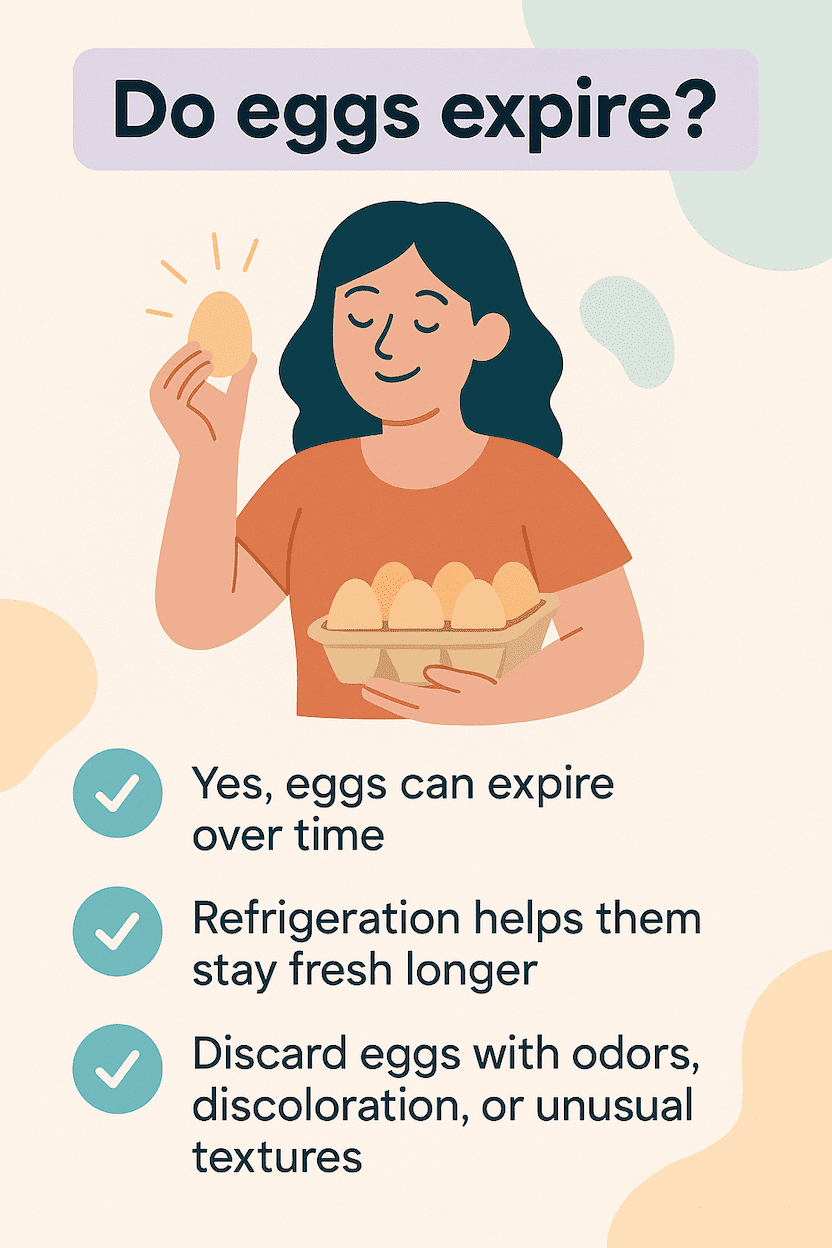Last update: November 4, 2025
7 minute read
Do Eggs Really Expire? A Nutrition-Focused Guide to Egg Safety and Freshness
Confused about egg expiration dates? Learn how to tell if eggs are still safe, why they last longer than you think, and how to store them for maximum freshness and nutrition.

By Derick Rodriguez, Associate Editor
Edited by Yerain Abreu, M.S.

So you're staring at a carton of eggs in your fridge, and the date stamped on the side was two weeks ago. Are they trash, or are they fine?
If you've ever second-guessed whether to crack one open or toss the whole dozen, you're not alone. Egg expiration is one of those everyday kitchen mysteries that trips up even careful eaters.
Here's what you actually need to know about egg freshness, safety, and how to make sure you're getting the most nutrition from every egg you eat.
Key takeaways
- Eggs are usually good for 3-5 weeks after the sell-by date if you keep them refrigerated; the date is more of a guideline than a strict deadline
- The float test works pretty well; a floating egg has more air inside, which means it's older (but not always bad)
- Keep them cold; storing eggs in the fridge at 40°F or below keeps them safe and preserves their vitamins
What do those dates on egg cartons actually mean?
The date on your egg carton isn't a real expiration date. It's usually a sell-by date or best-by date.
This tells stores how long to keep eggs on the shelf for top quality. The USDA says eggs stay good for 3 to 5 weeks after the sell-by date if you refrigerate them.
You might also see a pack date on the carton. It's a three-digit number that shows when the eggs were packed:
- 001: January 1st
- 032: February 1st
- 365: December 31st
Most eggs you buy were packed within a week of hitting the store, so they're fresher than you'd think.
VitaRx Tip
Write the date you bought them on the carton with a marker. Way easier than trying to figure out those number codes.
How to tell if an egg is still good
You don't need fancy equipment. Here are three easy tests:
1. The float test
What you need: A bowl of cold water
What to do:
- Fill a bowl with cold water
- Gently place the egg in the water
- Watch what happens
What it means:
- Sinks and lays flat: Fresh egg, perfectly safe
- Sinks but stands up: Older egg, but usually still fine to eat
- Floats to the top: Very old egg, probably not good
Why does this work? As eggs age, air gets inside through tiny holes in the shell. More air = more floating.
2. The sniff test
This is your most reliable test. Crack the egg into a bowl and smell it.
Fresh eggs barely smell like anything. Bad eggs smell horrible, like rotten sulfur or sewer gas. If it smells off at all, throw it out.
3. The look test
After you crack the egg, check how it looks.
Good egg signs:
- Thick, gel-like egg white
- Round, raised yolk that sits high
- Clear or slightly cloudy white
Bad egg signs:
- Watery, runny egg white
- Flat, broken yolk
- Pink, green, or black spots
- Weird colors anywhere
An older egg might have a flatter yolk and thinner whites, but that doesn't mean it's unsafe. It's just not super fresh.

Why you need to refrigerate eggs (if you live in the U.S.)
In America, egg companies wash eggs before selling them. This removes dirt and bacteria, but it also removes a natural coating called the bloom. The bloom seals the tiny holes in the eggshell and keeps bacteria out.
Once the bloom is gone, eggs need to stay cold. That's why American eggs must be refrigerated, but in some countries like England or France, they keep eggs on the counter.
How to store eggs properly:
- Keep them in the fridge at 40°F or below
- Leave them in their original carton (it protects them)
- Store them on a middle or lower shelf, NOT in the door
- The door temperature changes too much when you open and close it
Cold storage also helps preserve vitamins in eggs. Eggs contain vitamin D, B12, and choline (a nutrient that helps your brain). These break down faster when eggs sit in warm temperatures.
What happens if you eat a bad egg?
Food poisoning from eggs is usually caused by bacteria called Salmonella. If you eat contaminated eggs, you might get:
- Nausea and vomiting
- Diarrhea
- Stomach cramps
- Fever
- Headache
Symptoms usually start 6 to 72 hours after eating and can last several days. Most healthy people recover fine, but kids, older adults, and people with weak immune systems can get really sick.
Good news: Cooking eggs properly kills Salmonella. Cook eggs until both the white and yolk are firm (160°F internal temp). Scrambled eggs, hard-boiled eggs, and baked goods are safe. Runny yolks and raw cookie dough are riskier.
Can you freeze eggs?
Yes, but you can't freeze them in the shell. The liquid expands when frozen and the shell will crack.
How to freeze eggs:
- Crack eggs into a container
- Whisk them gently (don't beat them hard)
- Pour into a freezer-safe container or ice cube tray
- Label with the date
- Freeze for up to one year
When you're ready to use them, thaw in the fridge overnight. Frozen eggs work great for scrambles, omelets, and baking. They don't work as well for fried or poached eggs because the texture changes a bit.
Do eggs lose nutrition as they age?
A little bit, but not much. Research shows that vitamins A, E, and some B vitamins decrease slowly over time, especially if eggs aren't stored right.
But we're talking about maybe 5-10% less over several weeks, not a huge drop.
A four-week-old egg still gives you tons of nutrition.
Here's what one large egg contains:
Nutrient | Amount Per Egg | What It Does |
|---|---|---|
Protein | 6 grams | Builds muscle, keeps you full |
Choline | 147 mg | Helps brain and memory |
Vitamin D | 41 IU | Strengthens bones and immune system |
Vitamin B12 | 0.6 mcg | Gives you energy, makes red blood cells |
Lutein | 250 mcg | Protects your eyes |
Even an older egg that passes the freshness tests still has most of these nutrients.
VitaRx Tip
If you don't get much sun, pair eggs with a vitamin D3 supplement. Your body absorbs vitamin D better when you eat it with fat, and eggs have both.
Should you wash eggs before cooking?
Only wash eggs right before you use them, and only if they're dirty. Washing removes the protective coating and can actually push bacteria through the shell's tiny holes.
If you buy eggs from a farmers market or local farm, they might be unwashed. These can sit at room temperature for a few weeks. But once you refrigerate them or wash them, keep them cold from then on.
Common egg myths (busted)
Myth: Brown eggs are healthier than white eggs
False. Shell color depends on the type of chicken. Brown and white eggs have the same nutrition.
Myth: You should store eggs in the door of the fridge
Bad idea. The door temperature changes every time you open it. Keep eggs on a shelf.
Myth: Eggs expire exactly on the date printed
Nope. That date is about quality, not safety. Properly stored eggs last weeks longer.
Myth: A floating egg is definitely rotten
Not always. It's older and has more air inside, but it might still be fine. Use the sniff test.
BodyContent
Frequently asked questions (FAQ)
Here are some of the most frequently asked questions about eggs.
Final thoughts
Eggs don't suddenly go bad the day the carton says. With the right storage and a couple simple checks, you can use them weeks past the printed date.
That said, always trust your instincts. If an egg looks or smells wrong, toss it.
Knowing how to handle basic foods like eggs helps you make smarter choices in the kitchen. Whether you're tracking protein, taking vitamins, or just trying to waste less food, these small decisions matter. VitaRx helps make those choices easier with science-backed info tailored to how you actually live.
Sources and references
Editor

Derick Rodriguez
Derick Rodriguez focuses on editing health and wellness-related content. With over half a decade of experience in the digital realm, Derick has developed a unique skill set that bridges the gap between complex health concepts and accessible, user-friendly communication. His approach is deeply rooted in leveraging personal experiences and insights to illuminate the nuances of health and wellness topics, making them more approachable and empowering readers with knowledge and confidence.
Editor

Yerain Abreu
Yerain Abreu is a content strategist with over seven years of experience. He earned a Master's degree in digital marketing from Zicklin School of Business. He focuses on medical and health-related content, working with top healthcare professionals to ensure content is engaging and reliable.
At VitaRx, we're not just passionate about our work — we take immense pride in it. Our dedicated team of writers diligently follows strict editorial standards, ensuring that every piece of content we publish is accurate, current, and highly valuable. We don't just strive for quality; we aim for excellence.
Related posts
While you're at it, here are some other relevant articles you might be interested in.

Get your personalized vitamin recommendations in less than
5 minutes.
Get your personalized vitamin recommendations in less than
5 minutes.






